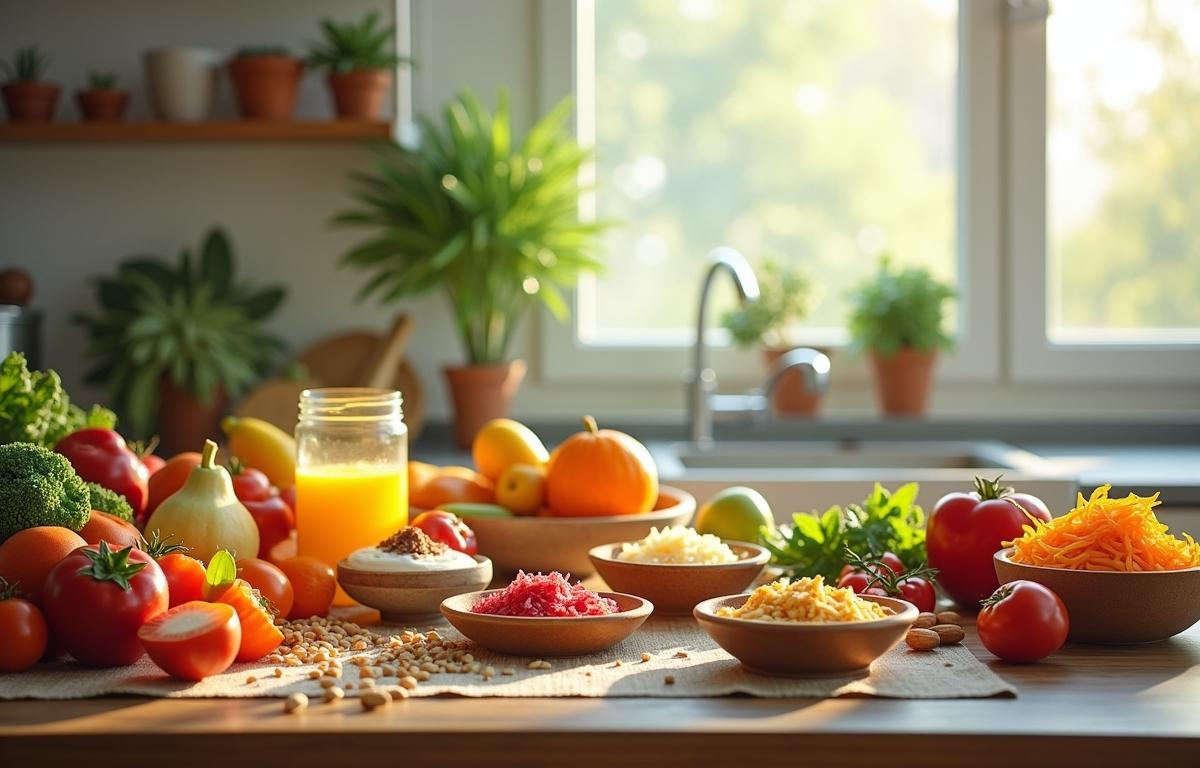Our daily wellness greatly depends on the often-overlooked foundation of gut health. When the balance of microorganisms in our digestive system is disturbed, we may notice changes in mood, energy, and overall resilience. Even small adjustments in our diets or habits can set us on the path to better intestinal flora and healthier digestion.
Many people think stomach health only matters when they experience issues like bloating relief or occasional discomfort. In reality, our gut acts as the command center for everything from immune response to nutrient absorption, affecting our entire well-being. By tuning in to your digestive health, you give yourself a stronger foundation for total vitality.
The importance of digestive health for whole-body benefits
Digestive health goes far beyond breaking down what we eat. A healthy digestive tract is crucial for proper nutrient absorption, which directly impacts skin health, energy, and even mental clarity. Maintaining this delicate system involves more than just eating a balanced meal it’s about ensuring the right mix of gut bacteria, digestive enzymes, and protective factors that keep everything running smoothly.
In recent years, terms like gut dysbiosis and leaky gut syndrome have cropped up, highlighting the importance of intestinal health. These conditions can pave the way for chronic issues and inflammation if left unattended. Paying attention to subtle signs such as unexplained fatigue or frequent digestive troubles can help you address imbalances before they spiral into more serious problems.
Why good digestion is a hallmark of wellness
When we experience healthy digestion, we absorb vitamins, minerals, and other nutrients more effectively. This process fuels our metabolism and supports colon health, which in turn contributes to a more robust immune system. Maintaining a regular fiber intake, along with the right types of food, can simplify gut healing and foster an environment where your intestinal flora thrives.
A smooth-running gut also helps keep gut inflammation in check. By limiting unnecessary stress on the bowel health, the body can focus on essential tasks like fighting off infections, regulating hormones, and maintaining steady energy levels.
Balancing your microbiome through everyday choices
Putting emphasis on microbiome balance is key to creating a resilient digestive system. Everyone carries a unique mix of gut bacteria, shaped by factors like diet, genetics, and lifestyle. Despite individual differences, there are universal strategies that can help support a robust microbiome and keep problems like food intolerances or bloating relief from taking center stage.
Eating plenty of whole foods, especially fruits and vegetables, supplies the digestive system with vital antioxidants and fiber. Alongside a fiber-rich diet, fermented foods think kimchi, yogurt, and sauerkraut inject a dose of beneficial probiotics that help crowd out harmful microbes.
Spotting the signs of gut dysbiosis
Gut dysbiosis refers to an imbalance in the composition of gut bacteria. Symptoms might include bloating, excess gas, or occasional stomach discomfort. If you notice these signs repeating after certain meals or in response to stress, they could indicate that your intestinal flora needs attention.
When your digestive health is compromised, it can weaken the body’s natural defenses. This is because immune system cells often gather in the digestive tract, keeping watch for harmful pathogens. Addressing dysbiosis quickly frees up resources for your immune system to do its job more effectively.
Probiotics and prebiotics: a powerful duo
Some of the best tools for promoting gut healing are probiotics and prebiotics. Probiotics often found in fermented foods are live beneficial microorganisms that help repopulate your microbiome with friendly strains. Prebiotics serve as food for these helpful microbes, further fostering an ideal environment in your GI health.
By including yogurt, kefir, or tempeh in your meals, you provide a direct source of gut-friendly bacteria. Pair that with fibrous foods like onions, garlic, and bananas to supply nutrients that sustain these microorganisms. This one-two strategy can improve nutrient absorption, support healthy digestion, and even help address issues like food intolerances or leaky gut.
Sourcing these gut supporters
Some individuals choose probiotic supplements when natural foods aren’t feasible. However, consult a professional if you suspect a deeper issue with your colon health. High-quality supplements can offer a beneficial boost, particularly if you shy away from certain food groups or have dietary limitations.
Meanwhile, prebiotic fibers can come from varied sources, ranging from legumes to whole grains. Ensuring consistent fiber intake not only nourishes probiotics but also boosts bowel health by promoting regularity and mitigating problems like constipation or diarrhea.
Gut-brain connection and emotional wellness
An intriguing aspect of intestinal health is the gut-brain axis, which links the two seemingly distant parts of the body. Researchers have uncovered how gut bacteria can influence mood, stress levels, and mental clarity. This frequent communication happens through nerve pathways, hormones, and immune signals, highlighting why the state of your digestive tract can affect overall mental well-being.
When the microbiome is in balance, neurotransmitters like serotonin (often referred to as the “feel-good chemical”) are produced in healthier amounts. Imbalances, on the other hand, can contribute to anxiety or mood swings. Supporting the gut-brain connection by focusing on healthy digestion and stress-management practices establishes a sturdy platform for feeling emotionally balanced and resilient.
Lifestyle habits for a calmer gut
Embracing mindfulness or practices like yoga and meditation can soothe an overactive stress response that might compromise gut health. Drinking enough water, prioritizing sleep, and including moderate exercise also help regulate your body’s inflammation levels. These behaviors act as protective measures against the wear and tear that daily life can impose on both your stomach health and emotional well-being.
Overcoming gut inflammation and leaky gut syndrome
Gut inflammation can manifest in various ways, from nagging cramps to a more chronic sense of unease in the digestive tract. Left unchecked, ongoing inflammation can damage the intestinal lining enough to cause something called leaky gut syndrome. This occurs when the barrier in your digestive system weakens, allowing unwanted substances into the bloodstream.
Leaky gut can trigger systemic inflammation and complications if not addressed promptly. Adopting an anti-inflammatory eating plan, full of whole foods and limited in excess sugar, can help calm irritation. Combined with probiotics and prebiotics, this can begin to repair the gut barrier and encourage stable intestinal flora.
Navigating food intolerances
Sometimes, hidden food intolerances worsen gut inflammation without being obvious. If you frequently feel uncomfortable after meals or notice persistent skin issues, it may be worth testing for intolerances. Eliminating common culprits like gluten, dairy, or soy at least on a trial basis can help pinpoint the source of the irritation and guide targeted improvements in your digestive health.
The power of fermented foods and a fiber-rich diet
Fermented foods such as miso, kombucha, or kimchi contain beneficial microbes that bolster the digestive system. This natural source of probiotics can help shift gut bacteria toward a healthier balance. In tandem with a fiber-rich diet, these choices feed your intestinal flora and keep everything moving smoothly.
Fiber promotes bowel health by acting as a bulking agent, helping to minimize constipation and regulate metabolism. Whole grains, beans, and fresh produce such as apples or berries provide a synergistic effect when combined with fermented foods. The result is a gut environment more capable of fending off pathogens and producing vital nutrients.
Diversifying your plate for better health
Including a variety of colors and textures in every meal offers the broadest range of vitamins, minerals, and phytonutrients. Think of your plate as a canvas showcasing leafy greens, bright orange squash, and protein sources like wild-caught fish or legumes. This natural diversity gives your digestive system everything it needs to support proper nutrient absorption and microbial balance, which ultimately translates into robust gut health.
Supporting long-term stomach health
Long-term stomach health relies on a mindful approach that encompasses daily eating habits, stress management, and consistent self-care. Even small increments of improvement can yield significant benefits, whether it’s adding another fruit to your morning routine or reducing added sugars. Over time, these small wins collectively lead to stronger gut resilience and fewer symptoms of imbalance.
Hydrating properly aids digestion by ensuring your digestive enzymes can do their job efficiently. Water also helps move food particles through your intestines, reducing the chance of stagnation. Staying hydrated is one of the simplest steps you can take for bloating relief and overall GI health.
Embracing gut-friendly strategies
Sometimes, all it takes to spark progress is an open mind and a willingness to experiment. If you’re feeling sluggish or notice recurring digestive issues, consider adding new fermented foods, adjusting your fiber intake, or exploring a variety of probiotics. Each change offers an opportunity to learn more about your body’s individual needs and optimize your approach.
Striving for a balance between whole-food nutrition and enjoyable treats keeps life manageable while maintaining the integrity of your digestive system. Remember that the pursuit of a happy gut isn’t about perfection it’s about consistently giving your body the supportive environment it needs to thrive. By recognizing how pivotal gut health can be, you equip yourself for genuine whole-body wellness that carries you through every stage of life.




